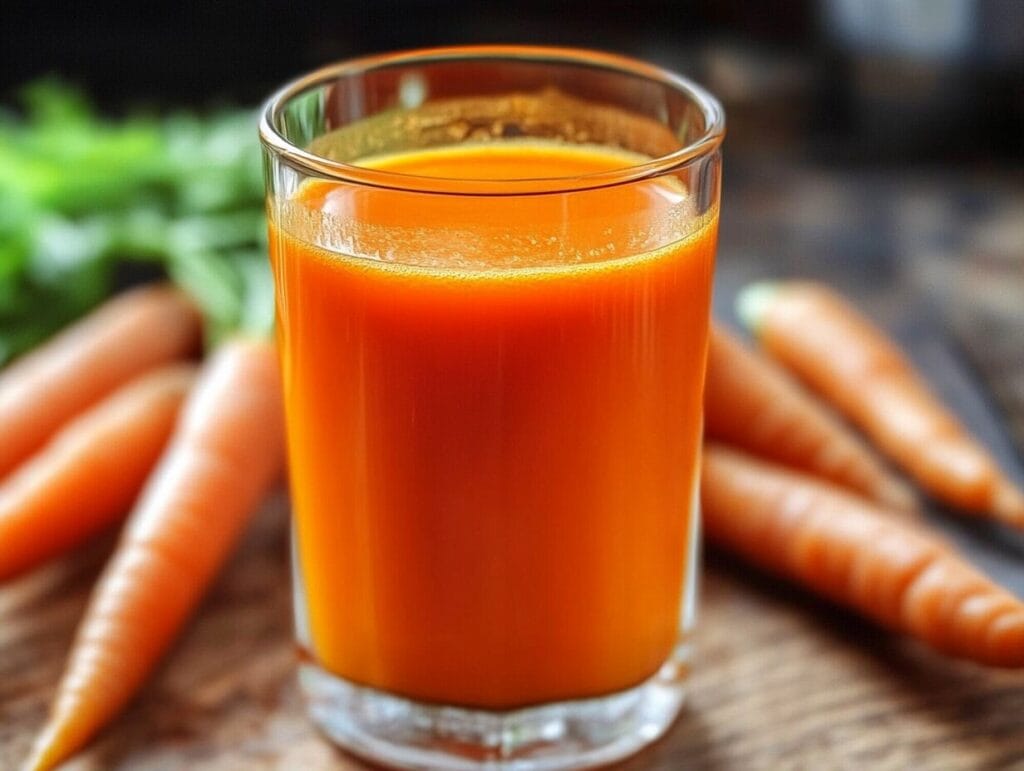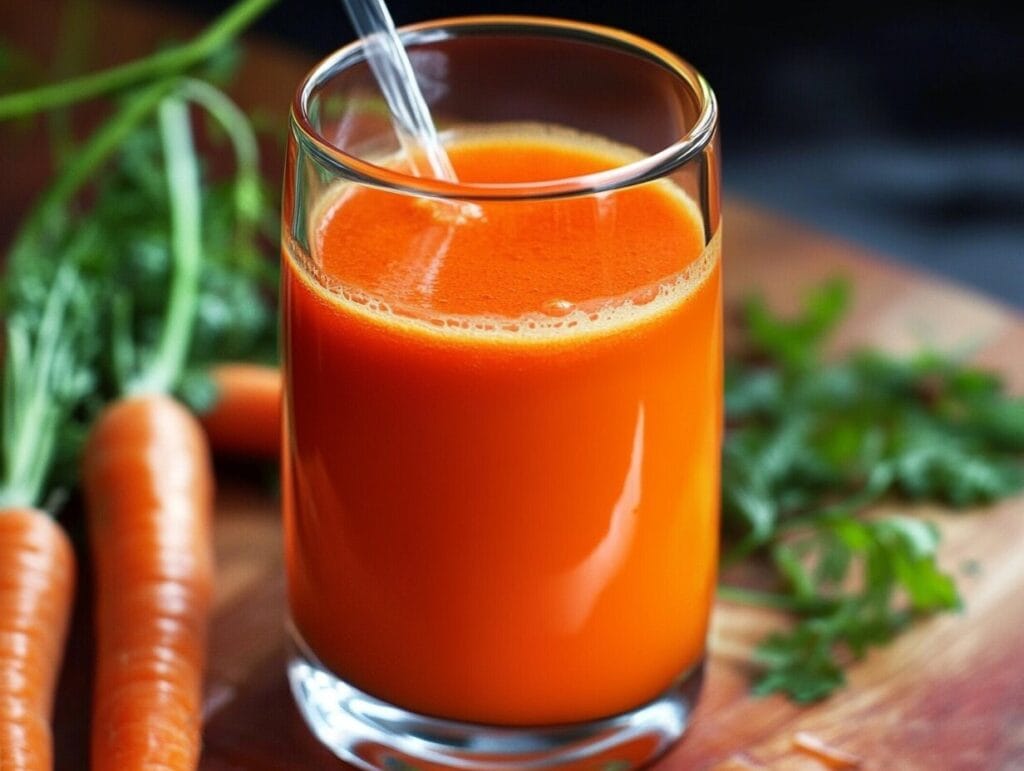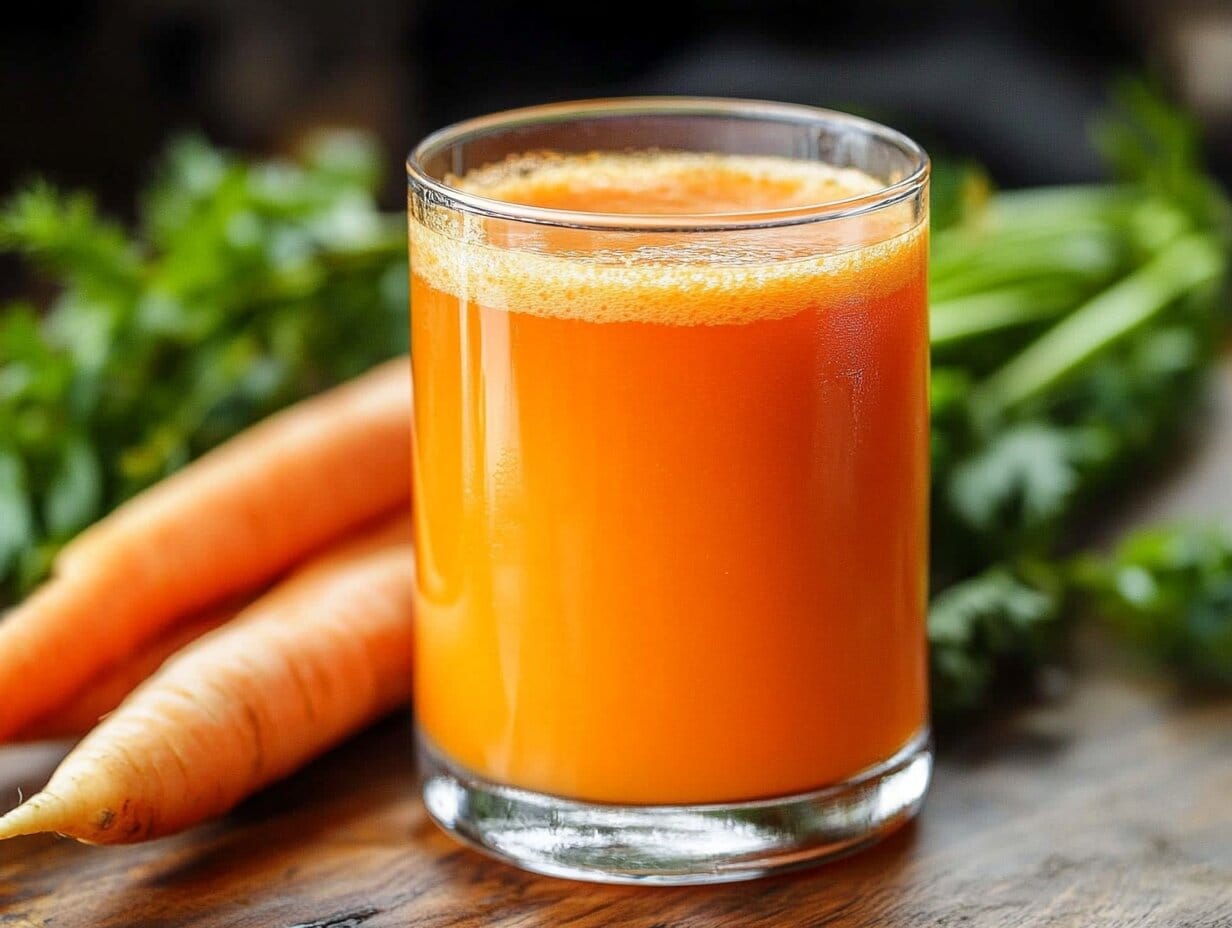Boost your health with this easy and delicious carrot juice recipe, packed with nutrients and refreshing taste! Whether you’re a health enthusiast or simply looking for a vibrant drink to energize your day, carrot juice is a must-have addition to your routine.
Why Carrot Juice is a Must-Try
Nutritional Benefits of Carrots
Carrots are like nature’s multivitamin. They’re brimming with essential nutrients, including Vitamin A, which supports healthy vision and immune function. Beta-carotene, the pigment responsible for carrots’ bright orange hue, transforms into Vitamin A in your body. Plus, they’re loaded with antioxidants, which combat free radicals and reduce inflammation. Isn’t it incredible how one humble vegetable can pack such a punch?
Beyond that, carrots also provide potassium, which helps regulate blood pressure, and Vitamin C, which boosts immunity. It’s no wonder health-conscious folks swear by it.
How Carrot Juice Supports Wellness
Carrot juice isn’t just tasty—it’s transformative. It hydrates your skin, giving you that natural glow. It supports digestion thanks to its fiber content and even aids in detoxification by promoting liver health. Imagine sipping your way to wellness—doesn’t that sound perfect?
Here’s the kicker: Drinking carrot juice regularly may even support weight management. Its natural sweetness satisfies cravings without spiking your blood sugar like processed snacks. A sweet treat that’s guilt-free? Yes, please!
Popularity of Carrot Juice Around the World
Did you know carrot juice is celebrated globally? In India, it’s a staple in winter diets to keep the body warm. Meanwhile, health bars in California are blending it with tropical fruits for an exotic twist. Its versatility has made it a favorite, whether it’s served solo or paired with other flavors.
Essential Ingredients for the Perfect Carrot Juice Recipe

Choosing the Right Carrots
Let’s talk carrots—the foundation of your juice. Not all carrots are created equal. Opt for fresh, firm, and brightly colored carrots for the best flavor. Organic carrots are ideal because they’re free from pesticides, but even conventional ones can work wonders if washed thoroughly.
Varieties like Nantes or Danvers are popular for juicing. Their naturally sweet and mild taste ensures you won’t need much else to create a flavor-packed drink.
Optional Add-Ons for Flavor and Nutrition
Want to take your carrot juice up a notch? Here’s where creativity comes in. Adding fruits like oranges or apples can balance the earthy flavor of carrots. For a spicy kick, toss in a knob of ginger. Feeling adventurous? A dash of cinnamon or turmeric can make your juice taste like a liquid sunset.
Not only do these additions enhance the taste, but they also supercharge the health benefits. Ginger aids digestion, turmeric fights inflammation, and citrus fruits boost immunity. It’s a win-win!
Step-by-Step Guide to Making Carrot Juice
Preparing the Carrots
First things first: wash your carrots thoroughly. Nobody likes a gritty sip! Peel them if you’re concerned about bitterness, though leaving the skin on retains more nutrients.
Next, chop them into manageable pieces. This ensures your juicer or blender doesn’t have to work overtime.
Using a Juicer vs. Blender
When it comes to juicing, you’ve got options. A juicer is the easiest route, extracting liquid and leaving the pulp behind. But if you’re blender-bound, don’t fret! Just blend your carrots with water and strain the mixture using a cheesecloth or fine-mesh sieve. It’s a bit more hands-on, but the result is just as delightful.
Mixing and Straining Techniques
Here’s where the magic happens. If you’re using a juicer, you’re good to go once the juice is extracted. But if you’re blending, pour the mixture into your strainer and gently press with a spoon to extract every golden drop.
Once strained, feel free to taste-test. Too thick? Add a splash of water. Not sweet enough? Drizzle in a little honey. Voila—you’ve just made homemade carrot juice!
Tips for Enhancing Your Carrot Juice Recipe

Experimenting with Fruits and Spices
Why stick to plain when you can jazz it up? Add fruits like pineapple or mango for a tropical vibe. Or sprinkle in warming spices like nutmeg and cloves to create a drink that feels like a hug in a glass. Trust me, the possibilities are endless.
Adjusting Sweetness Levels
Carrot juice has a natural sweetness, but it’s perfectly okay to tweak it. Add a squeeze of lemon for tartness or a dash of agave syrup for extra sweetness. This is your juice—make it yours!
Common Problems with Carrot Juice and How to Fix Them
Why Does My Carrot Juice Taste Bitter?
Ever sipped your freshly made carrot juice only to find it tasting bitter? It’s a common hiccup but an easy one to fix. Bitterness usually comes from older or overgrown carrots, as they tend to have a stronger earthy flavor.
The fix? Choose smaller, fresher carrots. If bitterness persists, balance it out with sweet fruits like apples or pears. Adding a splash of citrus, like orange juice or lemon, can also cut through the bitterness, leaving you with a well-rounded flavor.
How to Keep Carrot Juice Fresh Longer
Freshly made carrot juice is best enjoyed immediately for maximum nutrients and taste, but life doesn’t always allow that, right? If you need to store it, keep it in an airtight glass container in the refrigerator. It should stay fresh for up to 48 hours.
Here’s the catch: exposure to air oxidizes the juice, reducing its quality. To combat this, fill your container to the brim to minimize air exposure.
Balancing Pulp and Juice Ratio
Whether you’re team pulp or team no pulp, the texture of your carrot juice can make or break your experience. If your juice feels too gritty, you might have left too much pulp behind. On the flip side, over-straining can strip away some nutrients.
The happy medium? Experiment! Use a fine-mesh strainer for a smoother finish or leave a bit of pulp for extra fiber. It’s all about what feels right for you.
Variations of Carrot Juice Recipes to Try
Carrot-Orange Juice Combo
If you’ve never paired carrots with oranges, you’re missing out on a citrusy delight. The tanginess of oranges complements the natural sweetness of carrots perfectly, creating a juice that’s bright, refreshing, and bursting with Vitamin C.
Recipe Tip: For every 4 carrots, add 2 oranges. Blend, strain, and serve over ice for a summer-ready drink.
Spiced Carrot Juice with Ginger and Turmeric
Looking for a juice that screams health and warmth? Add a thumb-sized piece of ginger and a pinch of turmeric to your carrot juice. The ginger brings a spicy kick, while turmeric adds earthiness and a beautiful golden hue.
Not to mention, turmeric’s anti-inflammatory properties and ginger’s digestive benefits make this variation a powerhouse for your health.
Tropical Carrot-Pineapple Delight
Transport yourself to a tropical paradise with this fruity twist. Combine carrots, pineapple chunks, and a splash of coconut water for a refreshing drink that feels like a mini vacation in a glass.
For added zest, sprinkle in some lime juice. The result? A tangy-sweet concoction that’s perfect for hot afternoons or post-workout hydration.
Storing and Preserving Carrot Juice
Best Practices for Refrigeration
As we touched on earlier, airtight glass containers are your best friend when it comes to storing carrot juice. Avoid plastic containers as they can absorb odors and affect the juice’s taste.
Always refrigerate your juice promptly to preserve its nutrients. And if you’re prepping for a busy week, try making small batches every two days to keep your juice tasting fresh.
Can You Freeze Carrot Juice?
Yes, you can! Freezing carrot juice is a fantastic way to extend its shelf life. Pour the juice into freezer-safe containers, leaving some room at the top for expansion, and freeze for up to 3 months.
When you’re ready to drink, thaw it overnight in the fridge and give it a good shake before serving. Just note that freezing can slightly alter the texture, but the flavor and nutrients remain intact.
The Environmental Impact of Homemade Juices
Reducing Waste with Carrot Pulp
What do you do with the leftover carrot pulp? Don’t toss it—it’s packed with fiber and nutrients! You can use it in creative ways, like baking it into muffins, stirring it into soups, or even making a DIY face mask. Recycling the pulp reduces waste and adds extra value to your juicing process.
Supporting Sustainable Farming Practices
When sourcing your carrots, consider buying from local farmers or choosing organic options. Supporting sustainable farming not only ensures better-tasting produce but also reduces the environmental footprint of your juice.
Frequently Asked Questions About Carrot Juice Recipe
Can I Make Carrot Juice Without a Juicer?
Absolutely! A blender works just as well. Blend your carrots with a little water until smooth, then strain the mixture using a cheesecloth or sieve. It might take a little longer, but the results are equally delicious.
What Are the Best Carrots for Juicing?
Look for fresh, brightly colored carrots with no signs of wilting or cracking. Thinner carrots are often sweeter, while larger ones might have a stronger earthy taste. Organic varieties are ideal, but conventionally grown carrots work too when properly washed.
Is It Okay to Drink Carrot Juice Every Day?
Yes, but moderation is key. While carrot juice is incredibly healthy, drinking excessive amounts can lead to carotenemia, a harmless condition where your skin takes on a yellowish tint. Stick to a glass or two a day for balanced benefits.
Enjoy the Perfect Carrot Juice Anytime
Carrot juice is more than just a drink—it’s a gateway to better health, creativity in the kitchen, and even a little environmental mindfulness. Whether you prefer it plain, spiced, or fruity, there’s a carrot juice recipe out there for everyone. So grab your carrots, get juicing, and savor the natural goodness one sip at a time!


2 thoughts on “The Ultimate Guide to Carrot Juice Recipe”